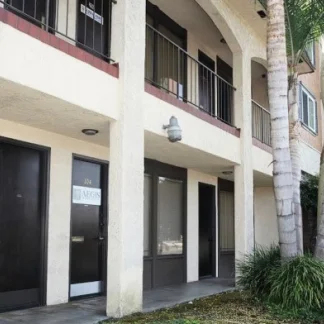Synergy Sober House
Synergy Sober House is a private rehab located in Los Angeles, California. Syner...
AEGIS Treatment Centers - Inglewood offers outpatient opioid drug rehab services and medication-assisted treatment (MAT) for adults in Inglewood, California. They offer specific programs based on gender and culture, as well as targeted services for pregnant women.
Outpatient treatment services include assessments, individual and group counseling, education on the impact of substance use, and peer-based support. They also offer psychoeducational programming, life skills training, case management, and relapse prevention. Approaches include cognitive behavioral therapy (CBT), motivational interviewing (MI), and holistic options such as mindfulness and relaxation techniques.
MAT is a research-based program designed to help those struggling with opioid use achieve long-term sobriety. It includes the long-term use of FDA-approved medications to reduce cravings and decrease the risk of relapse. Medications used at AEGIS Treatment Centers include buprenorphine (Suboxone) and methadone.
AEGIS Treatment Centers – Inglewood accepts a variety of insurance plans, including Medi-Cal, Medicare, HealthNet, Cigna, Blue Cross Blue Shield, United Healthcare, TRICARE, and Magellan. Different insurance plans have different coverage details, so be sure to check with your insurer to get full information regarding out-of-network benefits.
Contact us for more information: (310) 412-0879

Connect with AEGIS Treatment Centers - Inglewood by calling their admissions team directly.
(310) 412-0879 Website Get DirectionsResearch clearly demonstrates that recovery is far more successful and sustainable when loved ones like family members participate in rehab and substance abuse treatment. Genetic factors may be at play when it comes to drug and alcohol addiction, as well as mental health issues. Family dynamics often play a critical role in addiction triggers, and if properly educated, family members can be a strong source of support when it comes to rehabilitation.
Group therapy is any therapeutic work that happens in a group (not one-on-one). There are a number of different group therapy modalities, including support groups, experiential therapy, psycho-education, and more. Group therapy involves treatment as well as processing interaction between group members.
In individual therapy, a patient meets one-on-one with a trained psychologist or counselor. Therapy is a pivotal part of effective substance abuse treatment, as it often covers root causes of addiction, including challenges faced by the patient in their social, family, and work/school life.
Group therapy is any therapeutic work that happens in a group (not one-on-one). There are a number of different group therapy modalities, including support groups, experiential therapy, psycho-education, and more. Group therapy involves treatment as well as processing interaction between group members.
In individual therapy, a patient meets one-on-one with a trained psychologist or counselor. Therapy is a pivotal part of effective substance abuse treatment, as it often covers root causes of addiction, including challenges faced by the patient in their social, family, and work/school life.
In individual therapy, a patient meets one-on-one with a trained psychologist or counselor. Therapy is a pivotal part of effective substance abuse treatment, as it often covers root causes of addiction, including challenges faced by the patient in their social, family, and work/school life.
Synergy Sober House is a private rehab located in Los Angeles, California. Syner...
Sovereign Health provides mental health and substance abuse services for adults ...
Interconnection Grand Avenue Center for Dignity is a private rehab located in Lo...
New Beginnings Recovery is a private rehab located in Los Angeles, California. N...